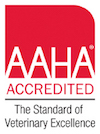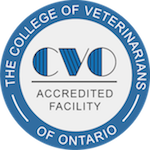Clients often ask me for advice on what to feed their pets. Or on the flip side, they will tell me their pet eats a great food – grain-free, holistic, first ingredient is meat, and so on.
When I assess a diet for a particular patient I consider a few key factors:
1. Pet age/life stage Puppies/kittens/pregnancy (growth phase), adults and seniors all have different nutritional requirements. Feeding an “all life stages” diet is effectively feeding a “growth” diet because pets in the growth phase have the highest nutritional requirements and an “all life stages” diet provides the nutritional requirements for growth. Therefore, they tend to be excessive when pets are no longer growing. So what do pets do with all the extra nutrition? They bulk up for winter. Put a little junk in the trunk. However you want to phrase it, adult and senior pets on an “all life stages” diet are almost always overweight which can take years off their lives.
2. Pet Size (with respect to dogs), Breed Predispositions Small dogs need small kibble and are generally at higher risk of bladder stones, pancreatitis, periodontal disease, to name just a few. Large breeds need slower growth during their puppy years and have a higher risk of arthritis and other orthopaedic conditions as they age. Not that either food would hurt the other, but it makes sense to customize if we can tailor their nutrition to benefit their overall health.
3. Activity Level Indoor cats do not need the same number of calories as the cat that patrols the neighbourhood. A couch pug-tato or a weekend warrior cottage dog won’t have the same calorie requirements as an agility dog. Be realistic when assessing your pet’s average activity level and also the intensity of that activity.
4. Are there pre-existing conditions? In periodontal disease, inflammatory bowel disease, bladder stones, kidney disease, diabetes, arthritis, obesity, and other conditions, nutrition can play a role, and in many cases a HUGE role! Whatever ails your pet, we can work with you to optimize their nutrition. Depending on their problems it might require adjustment to the quantity of their diet, a prescription diet for a specific problem, or perhaps a consultation with a veterinary nutritionist for a balanced homemade diet. It gets trickier when trying to manage multiple issues but we can consult with nutritionists about this too. There are so many options!
We all want what is best for our pets, me included, for both my patients and my own pets, Brigs and Chase. As pet owners we make the best decision we can with the information available to us. The problem is, most of the information available is marketing material designed to pull at our heart strings. There is a lot of misinformation to sift through. Often what sounds like the best can be more termed “trendy” and comes with a hefty price tag too. More on the evaluation of pet foods and trends next time.
Unfortunately, there isn’t a one-size-fits-all answer for pet nutrition, especially in Canada where there is very little regulation of the industry. Through a series of blog posts, we’ll continue to provide more information about pet nutrition to assist in selecting your pet’s best nutrition plan. As always, feel free to reach out to us at South Peel to discuss your pet’s current nutrition plan in more detail and any goals you may have for making adjustments.
Til next time,
Dr. Elaine Williams


